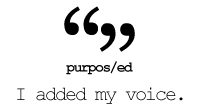It is make or break time for humanity and we have a responsibility to draw a line in the sand, admit our mistakes and create a system of education that can begin to undo the harm that we have done to the world. For all the talk over the last twenty years of the ‘global village’, it has not stopped us continuing to destroy our planet, to wage wars and to continue to ignore the inequalities in society. What is the purpose of education? Surely, it is to create unity by helping future generation to recognise the values that humanity share.
That was me in March 2011. Weirdly apposite right!?
Doug Belshaw included the quote1 in a post about ‘education for a post-pandemic future‘ with a number of others that featured in an online campaign to capture ideas about the ‘purpose of education‘. A book was even published collecting all of the 500 word contributions. My copy is sitting in my office at work. 😋
Re-reading the varying ideas collected in Doug’s post, not least my own words from nine years ago, gave me chills. They also left me feeling deeply sad. I don’t believe that we have moved forward in that time. Inequality in society, and in education, has only widened. Will it be better post-pandemic? I want to believe that things will change. I want to believe that after the lockdown is lifted, and life returns to normal, people will reevaluate the contribution schools make, not only in providing education, but also as an important component of their local communities.
Education is both a gift and a right. It can be the silver bullet; a cornerstone on which an open-minded egalitarian society can be built. Schools should be utopian spaces where ideas can be explored and debated; where creativity is encouraged; where our similarities and differences are celebrated. But society has to change first. We have to throw off the “mind-forged manacles” of capitalism; eschew entrenched divisions; and agree that we are all better off when we work to support each other.
If that can happen then education can serve its great purpose: Helping future generations to develop the thinking and skills that will allow them to contribute to, and shape the world around them.
- You can read my full 500 word contribution to the Purpos/ed campaign here: Busting a hole in the wall (the purpose of education).[↩]
